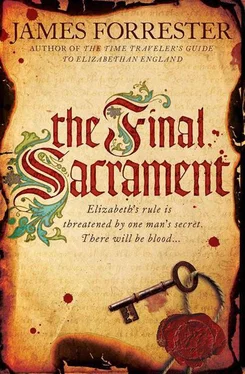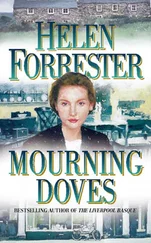James Forrester - Final Sacrament
Здесь есть возможность читать онлайн «James Forrester - Final Sacrament» весь текст электронной книги совершенно бесплатно (целиком полную версию без сокращений). В некоторых случаях можно слушать аудио, скачать через торрент в формате fb2 и присутствует краткое содержание. Жанр: Исторический детектив, на английском языке. Описание произведения, (предисловие) а так же отзывы посетителей доступны на портале библиотеки ЛибКат.
- Название:Final Sacrament
- Автор:
- Жанр:
- Год:неизвестен
- ISBN:нет данных
- Рейтинг книги:5 / 5. Голосов: 1
-
Избранное:Добавить в избранное
- Отзывы:
-
Ваша оценка:
- 100
- 1
- 2
- 3
- 4
- 5
Final Sacrament: краткое содержание, описание и аннотация
Предлагаем к чтению аннотацию, описание, краткое содержание или предисловие (зависит от того, что написал сам автор книги «Final Sacrament»). Если вы не нашли необходимую информацию о книге — напишите в комментариях, мы постараемся отыскать её.
Final Sacrament — читать онлайн бесплатно полную книгу (весь текст) целиком
Ниже представлен текст книги, разбитый по страницам. Система сохранения места последней прочитанной страницы, позволяет с удобством читать онлайн бесплатно книгу «Final Sacrament», без необходимости каждый раз заново искать на чём Вы остановились. Поставьте закладку, и сможете в любой момент перейти на страницу, на которой закончили чтение.
Интервал:
Закладка:
Mary was too old to plead her belly; the court would not believe her if she did. Besides, she was guilty, and in a cell full of desperate women. Twenty years ago she had found herself in prison for the theft of a silver-rimmed purse from a market stall. The penalty would have been hanging, had she not pleaded her belly. On that occasion she had been in a mixed cell, and among the male prisoners was a young man due to hang the next day; she had let him lie with her all night. After he had been killed, many others had taken his place, whether or not she wanted them to. All she knew about the father of her third daughter was that he had been a criminal. When the girl was born, Mary had been taken out of the cell to give birth in the warden’s house; her brother’s wife had acted as the midwife and managed to arrange her escape while only women were allowed into the birth chamber, before the clearing up was complete. Such a strategy was now beyond her. Even if her age had not been against her-even if she had not been in such a pitiful state-no one would come to her aid in another nine months. Her brother was dead and so was his wife. Besides, she suspected the jailers here wanted her to face trial and be put to death. She was not facing the noose but the punishment of being burned at the stake-high entertainment in many people’s eyes. In her ecstasy after stabbing her husband, she had cried with relief and told many people what she had done. She was not without supporters-a number of women quietly sympathized with her plight and were glad for her-but someone had told someone who in turn had told other men. The High Constable had ordered her to be arrested, on penalty of a heavy fine to be paid by the whole parish. That was how she had been whipped and now faced death by burning: for ridding the world of a vicious drunk, a bully and an abuser of his own stepdaughters.
Mary did not understand why the jailers did not pick either of the women for fornication but came toward her.
“Mary Vardine?” one asked, nudging her arm with his boot.
She did not answer. Somewhere beyond the bars, in another building, was a courtroom, and in that courtroom the evil of her crime would be announced, and her sentence officially spat out. They said that people normally lived to feel the pain even after the fat of their own feet had started to drip into the flames. Death was the only release. It would be better that she just died here, in this cell, of cold and hunger. She did not regret what she had done, and she would stab her husband over and over again if she had to. She might not have saved her daughters from all the indignities and sufferings of life, but she had put a permanent end to one of them.
The second jailer came over to where she lay and, together with the first, they lifted her to her feet. She made no attempt to stand, so they dragged her out of the cage and down the corridor to a chamber where a gentleman, Mr. Philips, was waiting to see her. There they tried to place her on a bench. She blinked in the light, then kept her eyes closed and collapsed onto her side.
“This is the woman?” asked Mr. Philips, looking down with disgust at her bloodied skin and filthy smock.
“It is,” replied the first jailer. “She stinks as rotten as her soul. She boasted about her crime. He was found in his own yard, stabbed in a frenzy. The constable had her whipped.”
Philips stretched out a gloved hand and lifted one of Mary’s eyelids with his thumb. She opened her eyes but said nothing. He withdrew his hand. “Lord Shrewsbury wants her spared,” he said.
“If that is Lord Shrewsbury’s will,” said the first jailer, “then we must obey, but the London justices surely won’t like it that he’s taken so many women now from an appointment with the Devil.”
Philips took off his glove and reached into a pocket. “Be that as it may, I have my orders and now you have yours.” He handed each of the men two silver coins. “Take her to Mistress Haig’s house; there she can be cleaned up and fed. After that, your custodial duty will be done. Mistress Haig’s man will see to the rest, as before.”
“Mr. Philips,” said the second jailer, whose lank hair fell across his face, “why does Lord Shrewsbury choose this woman? There are many who are hoping to see her burn-and many women far more deserving of compassion. We could easily find Lord Shrewsbury a younger and better-looking woman.”
Philips shook his head. “It is his old aunt’s decision. Lord Shrewsbury instructed me to follow the orders of Lady Percy’s steward, Benedict Richardson, in all things concerning this jail and his rights herein. As you know, Lord Shrewsbury has the power of life and death over convicted felons-an ancient prerogative. What I tell you is simply what Mr. Richardson has decided on behalf of Lady Percy. They are the ones exercising judgment, not Lord Shrewsbury.”
3
Clarenceux walked fast, managing the pain in his hip as best he could. He felt conscious of his awkward gait. From Fleet Street he turned left into Shoe Lane, with the smells of smoke from the morning’s fires and fresh horse dung in his nostrils. There were only a few white clouds in the blue sky, the mildest of breezes; despite the sharp cold, it was like a spring day. A long barnlike building on the west side of the street was being pulled down for new housing on the site. Several trees from the garden had also been cut and were being sawn up by workers who had half-blocked the road with their wagon. The men outside the cockpit were preparing for the afternoon’s entertainment, taking in birds in wooden cages from carts parked there and chalking up prices on a board. Clarenceux passed old houses with low beams and shutters wide open, women carrying baskets, servants cleaning steps, and men setting about their work. At Holborn, on the corner with Fetter Lane, beneath the tower of St. Andrew’s Church, he turned to watch the people and carts crossing the Fleet at Holborn Bridge.
A friend of his wife’s greeted him jovially with a “Good morrow to you, Mr. Harley,” and he acknowledged her with a nod, and a smile; but he turned slightly, indicating that he did not wish to be engaged in conversation. Even after she had gone he could not rid himself of the image of her smile. It was such a contrast: a man was about to be killed for nothing but the crime of being loyal to the Church and kind to his fellow Christians-and she was trying to engage him in idle chatter. How can anyone say “good morrow” when one of their company is going to be killed for a matter of conscience? The Romans killed Christ for preaching a message of peace and goodwill, and now the priests who carry God’s blessing are being killed by the State. Clarenceux asked himself the question: After fifteen hundred years of Christ’s ministry, has anything changed? In his heart he had to say: Yes, the hypocrisy is worse. But was that just his old age speaking, the timeless grumblings of men past their prime? People seemed to have lost both their sense of right and wrong, and their courage to stand up against injustice. They had learned to smile while the State executed dissenters. They separated their own interests from those of their communities. From now on, more and more people would live their lives as selfish individuals, not as persons belonging to a greater commonwealth.
Thomas knew that Clarenceux would walk along Shoe Lane. He had been twice with him to watch an execution-or, rather, to give succor to a condemned man. At the gate to the city liberties, he stopped, a hundred yards short of the church, where a house on the right-hand side protruded into the street. The mud here stank, having been used as a pissing place by men coming and going from the cockpit. After a minute, and seeing Clarenceux waiting for the procession of those condemned to die, he returned down Shoe Lane and cut across to Fetter Lane to wait for the procession to pass Barnard’s Inn.
Читать дальшеИнтервал:
Закладка:
Похожие книги на «Final Sacrament»
Представляем Вашему вниманию похожие книги на «Final Sacrament» списком для выбора. Мы отобрали схожую по названию и смыслу литературу в надежде предоставить читателям больше вариантов отыскать новые, интересные, ещё непрочитанные произведения.
Обсуждение, отзывы о книге «Final Sacrament» и просто собственные мнения читателей. Оставьте ваши комментарии, напишите, что Вы думаете о произведении, его смысле или главных героях. Укажите что конкретно понравилось, а что нет, и почему Вы так считаете.












